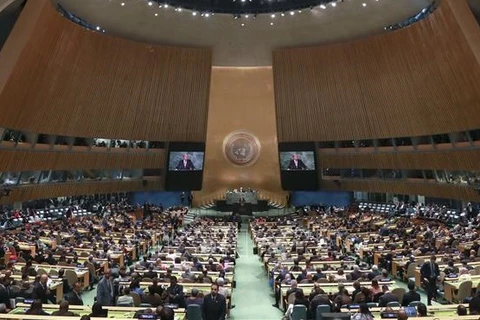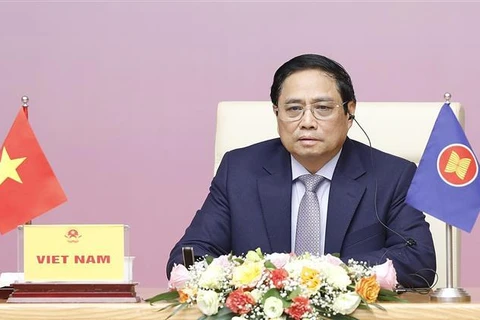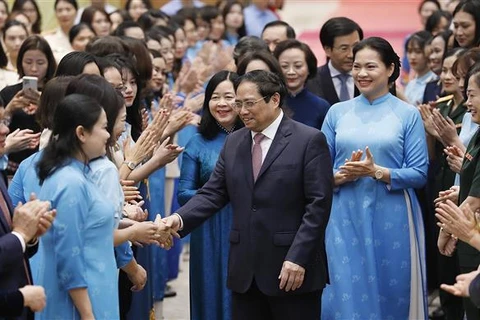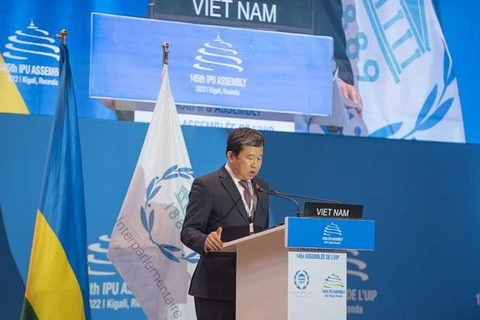Hanoi (VNA) - When it comes to women in political decision-making, Vietnam has in place an adequate legal framework to ensure gender equality in political and public life.
UNDP Resident Representative in Vietnam Ramla Khalidi wrote the comment in her article entitled “The path toward gender parity in politics in Vietnam” on the occasion of Vietnamese Women’s Day. The following is the full text of the article.
This week, the streets of Hanoi have been adorned with flowers, signaling the upcoming Vietnamese Women’s Day, a day celebrated every year in Vietnam on October 20. The day provides a good opportunity for UNDP in Vietnam to reflect about the importance of achieving gender equality, especially in women’s political participation and leadership and consider progress against this goal.
This imperative is ever more urgent given the multiple crises affecting the world today, including the climate crisis, COVID-19, and other humanitarian and developmental challenges which threaten to reverse development gains and which affect women disproportionately. The fallout from these crises have indeed highlighted the importance of ensuring women’s full participation in making public policies that recognise the needs and rights of all women and girls. Women’s empowerment and participation in politics is critical in building representative, just and effective institutions that play a crucial role in an inclusive recovery from the various new security risks and coping with arising development challenges.
When it comes to women in political decision-making, Vietnam has in place an adequate legal framework to ensure gender equality in political and public life. Article 26 of the Constitution clearly recognises that men and women enjoy equal rights in all fields. This has been reinforced in Article 11 of the Gender Equality Law (2006). Vietnam has achieved commendable progress compared with other countries in the region. According to the 2022 World Economic Forum Gender Gap Report, Vietnam scores 0.705 on a scale from 0 to 1 in terms of gender gap index, ranking 83 out of 146 countries, improving its position from 87 in 2021.
At the same time, Vietnam has other ambitious goals on women’s empowerment and women’s leadership. The Resolution 26-NQ/TW in 2018 of the Communist Party of Vietnam sets targets for women’s representation by 2030 for Party Committees at all levels (25%), and for National Assembly and People’s Councils at all levels (35%). The country’s Gender Equality Strategy 2021-2030 set targets that by 2025, 60% of state agencies and local governments must have women in key leader positions, rising to 75% by 2030.
Let’s review where we are today against these targets. In the recent 2021 elections, the proportion of women National Assembly deputies increased to 30.26%, the first time that Vietnam crossed the critical threshold identified as necessary for women to have a visible impact on decision-making process. However, women’s participation at the highest echelons of leadership in the Party and Government fell significantly. Only one woman remained in the Politburo, and women were no longer present in the top four highest leadership positions of the country. Women’s representation in executive government remains very low, with only two of 22 ministries and ministerial-level agencies, headed by a woman. According to the initial findings of our research on gender equality in public administration in Vietnam, during the last 10 years (2012-2022), although women account for 40% of ministerial staff on average, they only hold about 21% of key leadership positions, often concentrated at the deputy or vice positions. Moreover, the Review of the National Strategy of Gender Equality 2011-2020 conducted by the Ministry of Labour, Invalids and Social Affairs (MOLISA) found that all three targets on women’s political leadership were not achieved during the last 10 years.
We must reflect on the underlying reasons for the gaps between ambitious targets and the reality and how to translate all the national targets on gender equality in politics into a reality.
According to the publication “2020 Human Development Perspectives: Tackling Social Norms - A Game Changer for Gender Inequalities” released by the United Nations Development Programme (UNDP) on March 5, 2020, one of the identified reasons for gender inequalities is the deeply rooted bias that has challenged the achievement of genuine equality. These findings are corroborated by research we conducted in Vietnam. UNDP (PAPI) reports in 2019, 2020 and 2021 consistently indicate that social and cultural beliefs remain one of the major obstacles to expand women's participation at village and provincial levels where voters still prefer men candidates with families, over women candidates with families. In addition, according to the research “Roles, performance, and contributions of Vietnamese women representatives during the 2016-2021 period” women delegates are being siloed into certain areas of public policy such as education, health care and employment while their engagement in other important areas such as public finance, national security, security, economic policy, among others remains limited. According to the 2022 Gender Social Norms of the 2022 Human Development Index Report, in Vietnam, 93.75% of people still have at least one bias against gender equality and women’s empowerment and 65.08% of the people still hold biases about the political role of men and women.
In this context, UNDP in Vietnam stands ready to support the country in delivering its commitments and targets toward gender equality in the public sector. Our support in the coming years will be guided by the UNDP’s 2022-2026 Gender Equality Strategy which includes the following main focus areas: Strengthening women collective mobilisation, voice, and influence; advancing gender-responsive public policies and services; strengthening women leadership and participation in peace and recovery; changing negative social norms; and facilitating better data and analysis for policy making.
In 2022, the year that marks the 45th anniversary since the accession of Vietnam to the United Nations, UNDP in Vietnam has embarked strongly on strengthening women’s collective mobilisation, voice, and influence through several initiatives. As a matter of fact, more efforts are needed to grow and nurture the pipeline of future female leaders within the party and government by supporting and promoting young women officials in leadership roles. We collaborated with the Vietnam’s Women Union to establish 3 women’s leadership networks in Nghe An, Thai Binh and Kon Tum. These local camaraderie are meant to promote women in leadership positions through training, peer-learning, and networking opportunities. With thanks to the partnership with the Ho Chi Minh National Academy of Politics, we co-organised a special training program entitled “Young Women Ready to Lead” providing mentoring activities with the aim of building the capacity of 30 promising young women leaders.
Time is of the essence, not only because of approaching due dates against commitments for Vietnam’s own targets in 2025 and in 2030, but more importantly because women’s full and equitable participation is a precondition for sustainable and inclusive development that leaves no one behind. We must act now, with collective resolve and a common vision to be able to achieve gender parity in politics. On this Day, I encourage Vietnamese women from all walks of life to break the glass ceiling and overcome social biases; to have belief in your capability and your potential contribution to the development of Vietnam. UNDP in Vietnam looks forward to work with you all, government agencies, local non-governmental organisations, and development partners to accelerate the country’s efforts in achieving women’s equal and meaningful participation in politics in Vietnam./.
UNDP Resident Representative in Vietnam Ramla Khalidi wrote the comment in her article entitled “The path toward gender parity in politics in Vietnam” on the occasion of Vietnamese Women’s Day. The following is the full text of the article.
This week, the streets of Hanoi have been adorned with flowers, signaling the upcoming Vietnamese Women’s Day, a day celebrated every year in Vietnam on October 20. The day provides a good opportunity for UNDP in Vietnam to reflect about the importance of achieving gender equality, especially in women’s political participation and leadership and consider progress against this goal.
This imperative is ever more urgent given the multiple crises affecting the world today, including the climate crisis, COVID-19, and other humanitarian and developmental challenges which threaten to reverse development gains and which affect women disproportionately. The fallout from these crises have indeed highlighted the importance of ensuring women’s full participation in making public policies that recognise the needs and rights of all women and girls. Women’s empowerment and participation in politics is critical in building representative, just and effective institutions that play a crucial role in an inclusive recovery from the various new security risks and coping with arising development challenges.
When it comes to women in political decision-making, Vietnam has in place an adequate legal framework to ensure gender equality in political and public life. Article 26 of the Constitution clearly recognises that men and women enjoy equal rights in all fields. This has been reinforced in Article 11 of the Gender Equality Law (2006). Vietnam has achieved commendable progress compared with other countries in the region. According to the 2022 World Economic Forum Gender Gap Report, Vietnam scores 0.705 on a scale from 0 to 1 in terms of gender gap index, ranking 83 out of 146 countries, improving its position from 87 in 2021.
At the same time, Vietnam has other ambitious goals on women’s empowerment and women’s leadership. The Resolution 26-NQ/TW in 2018 of the Communist Party of Vietnam sets targets for women’s representation by 2030 for Party Committees at all levels (25%), and for National Assembly and People’s Councils at all levels (35%). The country’s Gender Equality Strategy 2021-2030 set targets that by 2025, 60% of state agencies and local governments must have women in key leader positions, rising to 75% by 2030.
Let’s review where we are today against these targets. In the recent 2021 elections, the proportion of women National Assembly deputies increased to 30.26%, the first time that Vietnam crossed the critical threshold identified as necessary for women to have a visible impact on decision-making process. However, women’s participation at the highest echelons of leadership in the Party and Government fell significantly. Only one woman remained in the Politburo, and women were no longer present in the top four highest leadership positions of the country. Women’s representation in executive government remains very low, with only two of 22 ministries and ministerial-level agencies, headed by a woman. According to the initial findings of our research on gender equality in public administration in Vietnam, during the last 10 years (2012-2022), although women account for 40% of ministerial staff on average, they only hold about 21% of key leadership positions, often concentrated at the deputy or vice positions. Moreover, the Review of the National Strategy of Gender Equality 2011-2020 conducted by the Ministry of Labour, Invalids and Social Affairs (MOLISA) found that all three targets on women’s political leadership were not achieved during the last 10 years.
We must reflect on the underlying reasons for the gaps between ambitious targets and the reality and how to translate all the national targets on gender equality in politics into a reality.
According to the publication “2020 Human Development Perspectives: Tackling Social Norms - A Game Changer for Gender Inequalities” released by the United Nations Development Programme (UNDP) on March 5, 2020, one of the identified reasons for gender inequalities is the deeply rooted bias that has challenged the achievement of genuine equality. These findings are corroborated by research we conducted in Vietnam. UNDP (PAPI) reports in 2019, 2020 and 2021 consistently indicate that social and cultural beliefs remain one of the major obstacles to expand women's participation at village and provincial levels where voters still prefer men candidates with families, over women candidates with families. In addition, according to the research “Roles, performance, and contributions of Vietnamese women representatives during the 2016-2021 period” women delegates are being siloed into certain areas of public policy such as education, health care and employment while their engagement in other important areas such as public finance, national security, security, economic policy, among others remains limited. According to the 2022 Gender Social Norms of the 2022 Human Development Index Report, in Vietnam, 93.75% of people still have at least one bias against gender equality and women’s empowerment and 65.08% of the people still hold biases about the political role of men and women.
In this context, UNDP in Vietnam stands ready to support the country in delivering its commitments and targets toward gender equality in the public sector. Our support in the coming years will be guided by the UNDP’s 2022-2026 Gender Equality Strategy which includes the following main focus areas: Strengthening women collective mobilisation, voice, and influence; advancing gender-responsive public policies and services; strengthening women leadership and participation in peace and recovery; changing negative social norms; and facilitating better data and analysis for policy making.
In 2022, the year that marks the 45th anniversary since the accession of Vietnam to the United Nations, UNDP in Vietnam has embarked strongly on strengthening women’s collective mobilisation, voice, and influence through several initiatives. As a matter of fact, more efforts are needed to grow and nurture the pipeline of future female leaders within the party and government by supporting and promoting young women officials in leadership roles. We collaborated with the Vietnam’s Women Union to establish 3 women’s leadership networks in Nghe An, Thai Binh and Kon Tum. These local camaraderie are meant to promote women in leadership positions through training, peer-learning, and networking opportunities. With thanks to the partnership with the Ho Chi Minh National Academy of Politics, we co-organised a special training program entitled “Young Women Ready to Lead” providing mentoring activities with the aim of building the capacity of 30 promising young women leaders.
Time is of the essence, not only because of approaching due dates against commitments for Vietnam’s own targets in 2025 and in 2030, but more importantly because women’s full and equitable participation is a precondition for sustainable and inclusive development that leaves no one behind. We must act now, with collective resolve and a common vision to be able to achieve gender parity in politics. On this Day, I encourage Vietnamese women from all walks of life to break the glass ceiling and overcome social biases; to have belief in your capability and your potential contribution to the development of Vietnam. UNDP in Vietnam looks forward to work with you all, government agencies, local non-governmental organisations, and development partners to accelerate the country’s efforts in achieving women’s equal and meaningful participation in politics in Vietnam./.
VNA



























